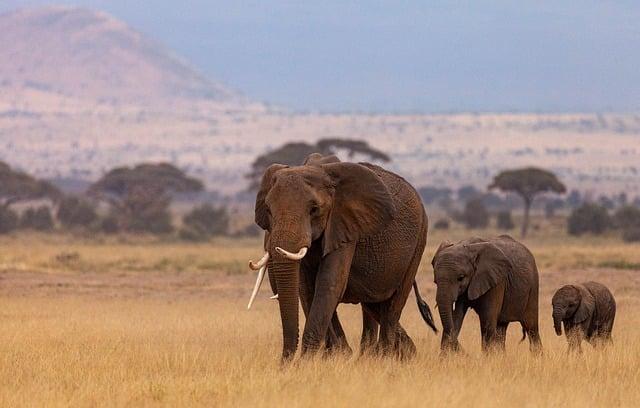In the heart of a continent where ancient landscapes whisper tales of time and vibrant cultures paint a mosaic of diversity, Africa stands at a crossroads of tradition and modernity. Here, the call for sustainable tourism echoes across sweeping savannas, lush rainforests, and sun-kissed coastlines. This journey into sustainable tourism practices in Africa is not just about preserving breathtaking vistas or protecting endangered wildlife. It is a narrative woven with the threads of innovation, community empowerment, and environmental stewardship. As travelers, stakeholders, and local communities unite to chart a path forward, this article delves into the transformative power of tourism that honors both people and planet, seeking a harmonious balance between exploration and conservation. Join us as we explore how Africa is redefining the art of travel, ensuring that its treasures endure for generations to come.
Eco-Friendly Lodging Innovations Across the African Continent
Across Africa, the hospitality industry is embracing sustainable tourism with a wave of innovative eco-friendly lodging options. From the sun-drenched savannahs to the lush tropical coastlines, lodges and hotels are incorporating green practices to minimize their environmental footprint. Solar power is increasingly popular, harnessing the abundant sunlight to generate electricity and reduce reliance on fossil fuels. Many establishments have implemented rainwater harvesting systems, ensuring water conservation in areas where it is a precious resource.
- Locally-sourced building materials that blend harmoniously with the environment
- Waste reduction initiatives, including composting and recycling programs
- Integration of natural ventilation and cooling systems to reduce energy consumption
Additionally, the concept of community-based tourism is thriving, providing visitors with authentic cultural experiences while supporting local economies. By engaging local communities in the tourism process, these lodgings foster cultural exchange and economic empowerment. Guests are often encouraged to participate in local traditions, crafts, and culinary practices, deepening their connection to the region. This holistic approach not only enriches the visitor experience but also ensures that tourism contributes positively to the environment and society.

Empowering Local Communities Through Responsible Tourism
Across the vast and diverse landscapes of Africa, a growing movement is reshaping the way we perceive travel. At the heart of this transformation lies a commitment to fostering growth and resilience in local communities. By embracing sustainable tourism practices, travelers can play an active role in nurturing these communities while enjoying the continent’s rich cultural and natural heritage. One key aspect of this approach involves engaging with local guides and artisans, ensuring that tourism dollars directly benefit those who preserve and share their traditions. Furthermore, choosing eco-friendly accommodations and participating in community-based tourism initiatives helps to minimize environmental impacts and support conservation efforts.
- Support Local Economies: Opt for locally-owned businesses and tour operators.
- Cultural Respect: Engage with and respect the customs and traditions of host communities.
- Conservation Efforts: Participate in activities that promote wildlife protection and habitat preservation.

Preserving Wildlife and Natural Habitats: A Collaborative Approach
In Africa, the intersection of tourism and conservation has given rise to a novel paradigm where sustainable tourism practices are at the forefront of efforts to protect wildlife and natural habitats. This collaborative approach involves local communities, governments, and international organizations working together to ensure that tourism activities do not jeopardize the delicate ecosystems and biodiversity of the continent. Initiatives such as eco-lodges and community-based tourism projects are designed to provide economic benefits to local populations while preserving the environment. These projects emphasize the importance of using local materials, employing residents, and promoting cultural heritage.
- Community Involvement: Engaging local communities in tourism planning and management.
- Conservation Education: Educating tourists on the importance of wildlife conservation.
- Eco-friendly Infrastructure: Developing accommodations and facilities with minimal environmental impact.
- Wildlife Protection: Supporting anti-poaching efforts and wildlife monitoring programs.
By adopting these practices, African nations are not only safeguarding their natural treasures but also ensuring that tourism remains a viable economic driver for future generations. This collaborative model highlights the potential for tourism to act as a catalyst for positive change, fostering a deeper connection between visitors and the rich tapestry of life that thrives across the continent.

Harnessing Technology for Sustainable Travel Solutions in Africa
In the quest for more sustainable travel solutions, Africa is leveraging cutting-edge technology to transform its tourism sector. By integrating innovative digital tools and sustainable practices, African countries are enhancing the traveler experience while minimizing environmental impact. The adoption of mobile apps that provide real-time information on eco-friendly accommodations and local conservation efforts is one way technology is making a difference. Furthermore, the use of drones and satellite imagery in wildlife conservation projects helps protect biodiversity, ensuring that tourists can continue to enjoy Africa’s rich natural heritage.
- Eco-friendly transportation: Electric safari vehicles and solar-powered boats are reducing carbon footprints.
- Smart waste management: Technology-driven waste solutions, such as waste-to-energy plants, are being implemented in popular tourist destinations.
- Digital payment systems: These facilitate cashless transactions, supporting local economies and promoting responsible tourism.
These technological advancements not only promote sustainability but also create opportunities for local communities. By supporting initiatives that harness technology for sustainable travel, tourists contribute to a more resilient and eco-conscious tourism industry in Africa.
Insights and Conclusions
As the sun sets over the vast and varied landscapes of Africa, casting golden hues across its savannahs, deserts, and rainforests, the promise of sustainable tourism illuminates a path forward. This continent, rich in natural beauty and cultural heritage, stands at the threshold of a tourism revolution—one that harmonizes the aspirations of travelers with the needs of the environment and local communities.
By embracing sustainable tourism practices, Africa is not only preserving its unparalleled biodiversity and vibrant cultures but also fostering economic growth and social development. Each initiative, from eco-friendly lodges to community-led conservation projects, is a testament to the continent’s commitment to a more sustainable future. As global travelers, the choices we make can echo across generations, ensuring that Africa’s treasures endure for those who come after us.
In this delicate dance between exploration and preservation, Africa invites us to be more than mere spectators. It calls on us to be conscious participants in a journey that respects and uplifts. As we close this chapter on sustainable tourism practices in Africa, let us carry forward the stories of innovation and resilience, knowing that our footprints can leave a lasting, positive impact on this remarkable continent.

































